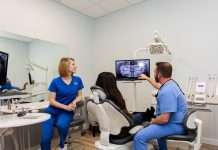Whether you’re struggling with sinus problems, allergies, scratchy throat or hearing loss from congestion, there are many professionals who can help you to feel and function better. Discuss your challenges with your primary physician to determine the best path forward and to find the specialist that works best for you. Check out ent and audiologist difference details given below:
ENT vs. Audiologist
For those struggling specifically with balance problems or hearing loss, starting out with an audiologist is a good option. Either of those conditions can be assessed and treated by an audiologist.
For example, you may be suffering from balance problems when the weather changes, or you may struggle with hearing problems with everyone wearing a mask. For many, COVID-19 has been a strong reminder that we may be doing a lot of lip-reading.
Audiologists can also help those who struggle with ringing in the ears or tinnitus. You may seek the help of an audiologist to get fitted for hearing aids that are rechargeable or undergo other forms of assistive tools.
Ear Nose and Throat = Otolaryngologist
There’s no difference between an ENT and an Otolaryngologist, but Ear Nose and Throat doctor is easier to say and to understand. An otolaryngologist is the physician to see if your struggle with
- chronic sinus inflammation or infections
- allergy flare-ups that turn into infections
- allergic reactions that cause problems with hearing and balance
- conditions best treated by surgery
Your sinus cavity is a series of large cavities that allow airflow in through the nose. The sinus cavities are constructed of soft tissues, but if you struggle with allergy flare-ups or severe sinus infections, you may find that this soft tissue becomes chronically inflamed and does not allow mucus to drain away. This mucus is an excellent breeding ground for bacterial infections, which can lead to further inflammation.
Should someone suffering from chronic sinus inflammation no longer be able to reduce the inflammation so it can effectively drain, they may need to undergo a sinus surgery to remove some of the damaged tissue.
However, anyone facing sinus surgery would do well to undergo immunotherapy for their allergies in an effort to reduce the tissue without surgery and the risk of further scarring.
What to Expect During an Audiologist Appointment
During your appointment with your audiologist, you’ll start with a consult to determine the nature of the problem and the reason for your visit. Your ears will then be checked for blockages or scars. Next, your audiologist will check how the middle ear functions, including the function of the ear drum. Finally, you’ll have your hearing tested. If you’re struggling with any balance issues, your eustachian tubes will be checked.
You may also at this time be fitted for hearing aids to help you overcome hearing loss from nerve damage or illness. Finally, if your audiologist has concerns about problems that could be causing your hearing challenges or balance problems that aren’t related to their exam, you may be directed on to an ENT specialist.
What to Expect During an ENT Appointment
Any appointment with either an audiologist or an ENT will likely come from a referral, so make sure to bring your documentation and your insurance paperwork. Track and keep a list of your symptoms and their severity throughout the day. Your physician needs to know exactly what your challenges are.
Your physician will also want to take a look into the sinus cavities. This is done with a nasal endoscope that is passed up into the sinuses through a nostril. The scope is flexible and very fine; if your sinuses are severely inflamed and you suffer any discomfort, be sure to let your physician know immediately.
More than Just Headaches and Allergies
Severe sinus inflammation can lead to dangerous infections. Even if an antibiotic seems to clear up the obvious signs of infection, the inflammation can easily return, and when it does you can suffer another infection.
These infections can quickly become dangerous, leading to infections around your eyes and even inflammation of the spinal cord, or meningitis. For those who have to move from sinus inflammation to sinus infection and back again, being on antibiotics for round after round is very hard on your immune system, your gut and your overall health.
If you’ve resigned yourself to chronic sinus problems because older family members have long struggled with them, it’s important to note that there are many new treatments available for conditions such as environmental allergies that can trigger an inflammatory response. Your ENT doctor in Princeton NJ can give you more guidance on the best way to fight chronic inflammation and the following infections that never seem to go away.
A Final Comparison
The details given in the post were about the ent and audiologist difference. An audiologist is a professional who may or may not have a doctorate. Audiologists can check your ear canal for blockages or scarring damage from infection. They can also test your ear drum and review your eustachian tube condition to protect your balance. Finally, they can test your hearing, determine your frequency loss and help you find the most effective method of amplification to help you hear better.
An ear, nose and throat doctor or ENT is an MD who can take a look at your sinus cavities, help you manage inflammation to fight infection, repair damaged sinus tissue surgically, and help you get on a plan to treat your allergies more effectively. If allergies are the source of your sinus inflammation and the subsequent and repeated infections, temporary relief from inflammation may be a good start, but allergy management is critical to building better health.
Both audiologists and ENT’s can boost your quality of life and overall health. No matter the source of your hearing loss, you will need an audiologist to be properly fitted and get the right hearing aids. No matter the source of your sinus or vocal inflammation, you will need an ENT to manage your inflammation and infection until your allergy source can be treated.







